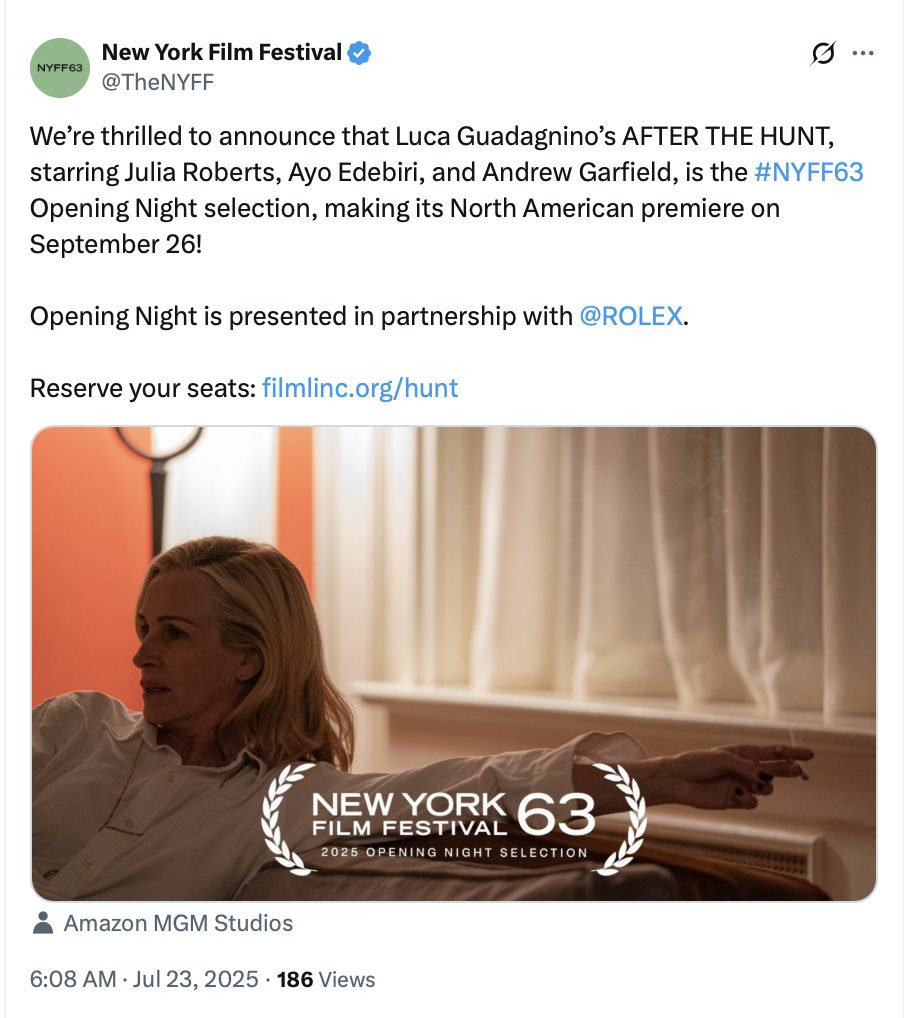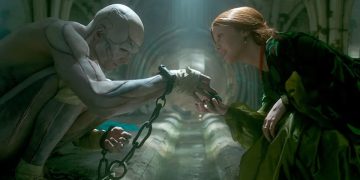The New York Film Festival has given Luca Guadagnino’s After the Hunt the opening night slot:

After the Hunt has a Hitchcockian tone to it, at least judging from the trailer. The script plays like a slow-burning thriller, too. It is sure to “spark debate” and dive into “the discourse,” I can promise you that. The script did not factor in race or racism but casting Ayo Edebiri in a key role does make it less about Me Too and more about race and TikTok’s favorite topic of “white privilege.” So we’ll have to see how all of that plays out – but I’m fascinated by what he might do with the script.
The problem with DEI mandates, IMO, is that because all films have to follow those rules, it robs performers of their worth, in a way. Although those inside the bubble pretend not to notice, most people can see it quite plainly. They know to qualify for the Oscars, now they have to meet those requirements. I think in this case, Edebiri might have been cast because she’s funny, talented, and perfect for the role. It wasn’t written to be about race, but there is no escaping it because of who she is.
Judging from the trailer, Guadagnino wisely avoids the elephant in the room but rather dives right in, which is brave of him. George Clooney threw off his film entirely when he cast a Black actress in the role of the unattainable blonde in The Tender Bar. He erased the entire point of her character and set it off in an entirely different direction. They can’t pretend people haven’t been screamed at for a decade about racial dynamics. It doesn’t just go away. But if your story is about a working-class guy whose life mirrors The Great Gatsby, you can’t just pretend that race wasn’t a factor at Yale in the 1980s.
In this case, making it about race (intentionally or not) and not just Me Too accusations takes it to a different place than it would have gone, and will allow many people to sit comfortably with their beliefs rather than challenge them because it is verboten to do so. With race taken out of it, it might have been more an analysis of “believe women.”
Is it a showcase for Julia Roberts? Absolutely, but again, the race issue will reflect on her, and maybe not in a positive way, but who knows? I will keep an open mind.
The New York Film Festival has never brought in a Best Picture winner, but it is a good starting place for a nominee:
Opening Night Films at the New York Film Festival (1963–2025)
-
- 1963: The Exterminating Angel (Luis Buñuel, Mexico)
- 1964: Hamlet (Grigori Kozintsev, Soviet Union)
- 1965: Alphaville (Jean-Luc Godard, France)
- 1966: Loves of a Blonde (Miloš Forman, Czechoslovakia)
- 1967: The Battle of Algiers (Gillo Pontecorvo, Italy/Algeria)
- 1968: Capricious Summer (Jiří Menzel, Czechoslovakia)
- 1969: Bob & Carol & Ted & Alice (Paul Mazursky, USA)
- 1970: The Wild Child (François Truffaut, France)
- 1971: The Debut (Gleb Panfilov, Soviet Union)
- 1972: Chloe in the Afternoon (Éric Rohmer, France)
- 1973: Day for Night (François Truffaut, France)
- 1974: Don’t Cry with Your Mouth Full (Pascal Thomas, France)
- 1975: Conversation Piece (Luchino Visconti, Italy)
- 1976: Small Change (François Truffaut, France)
- 1977: One Sings, the Other Doesn’t (Agnès Varda, France)
- 1978: A Wedding (Robert Altman, USA)
- 1979: Luna (Bernardo Bertolucci, Italy/USA)
- 1980: Melvin and Howard (Jonathan Demme, USA)
- 1981: Chariots of Fire (Hugh Hudson, UK)
- 1982: Veronika Voss (Rainer Werner Fassbinder, West Germany)
- 1983: The Big Chill (Lawrence Kasdan, USA)
- 1984: Country (Richard Pearce, USA)
- 1985: Ran (Akira Kurosawa, Japan)
- 1986: Down by Law (Jim Jarmusch, USA)
- 1987: Dark Eyes (Nikita Mikhalkov, Soviet Union/Italy)
- 1988: Women on the Verge of a Nervous Breakdown (Pedro Almodóvar, Spain)
- 1989: Too Beautiful for You (Bertrand Blier, France)
- 1990: Miller’s Crossing (Joel and Ethan Coen, USA)
- 1991: The Double Life of Veronique (Krzysztof Kieślowski, Poland/France)
- 1992: Light Sleeper (Paul Schrader, USA)
- 1993: Short Cuts (Robert Altman, USA)
- 1994: Pulp Fiction (Quentin Tarantino, USA)
- 1995: Shanghai Triad (Zhang Yimou, China)
- 1996: Secrets & Lies (Mike Leigh, UK)
- 1997: The Ice Storm (Ang Lee, USA)
- 1998: Celebrity (Woody Allen, USA)
- 1999: All About My Mother (Pedro Almodóvar, Spain)
- 2000: Dancer in the Dark (Lars von Trier, Denmark)
- 2001: Va Savoir (Jacques Rivette, France)
- 2002: About Schmidt (Alexander Payne, USA)
- 2003: Mystic River (Clint Eastwood, USA)
- 2004: Look at Me (Agnès Jaoui, France)
- 2005: Good Night, and Good Luck. (George Clooney, USA)
- 2006: The Queen (Stephen Frears, UK)
- 2007: The Darjeeling Limited (Wes Anderson, USA)
- 2008: The Class (Laurent Cantet, France)
- 2009: Wild Grass (Alain Resnais, France)
- 2010: The Social Network (David Fincher, USA) (should have won)
- 2011: Carnage (Roman Polanski, France/Germany/Poland/Spain)
- 2012: Life of Pi (Ang Lee, USA) (won Best Director)
- 2013: Captain Phillips (Paul Greengrass, USA)
- 2014: Gone Girl (David Fincher, USA)
- 2015: The Walk (Robert Zemeckis, USA)
- 2016: 13th (Ava DuVernay, USA)
- 2017: Last Flag Flying (Richard Linklater, USA)
- 2018: The Favourite (Yorgos Lanthimos, UK/Ireland/USA)
- 2019: The Irishman (Martin Scorsese, USA)
- 2020: Lovers Rock (Steve McQueen, UK)
- 2021: The Tragedy of Macbeth (Joel Coen, USA)
- 2022: White Noise (Noah Baumbach, USA)
- 2023: May December (Todd Haynes, USA)
- 2024: Nickel Boys (RaMell Ross, USA)
- 2025: After the Hunt (Luca Guadagnino, USA)















